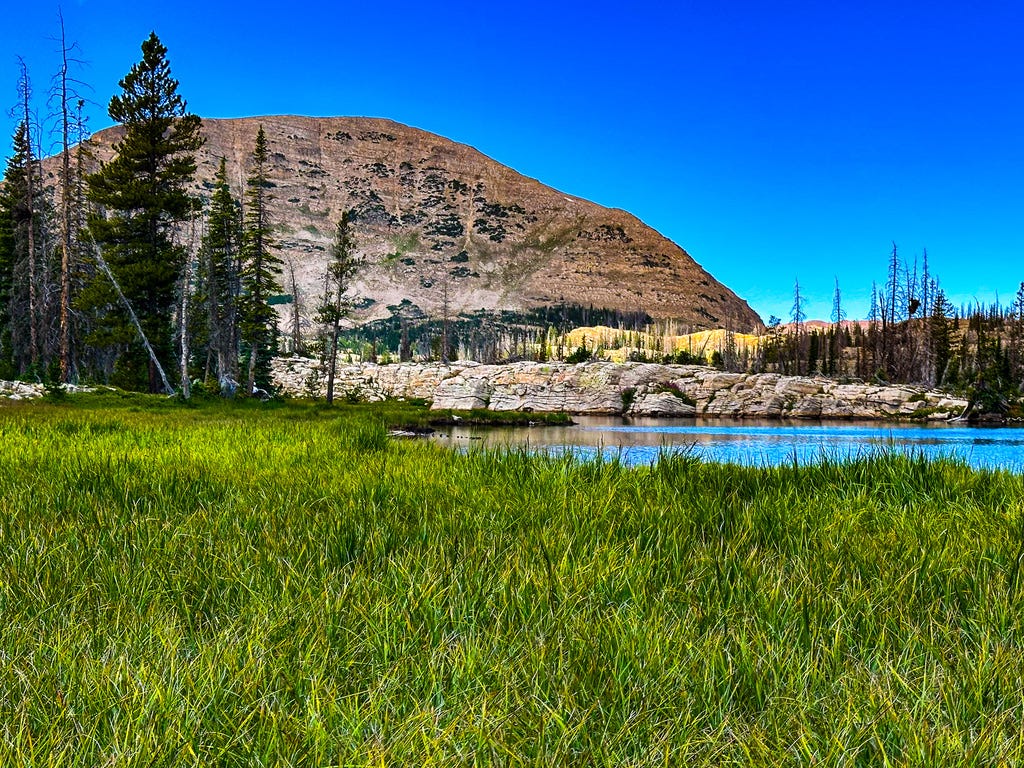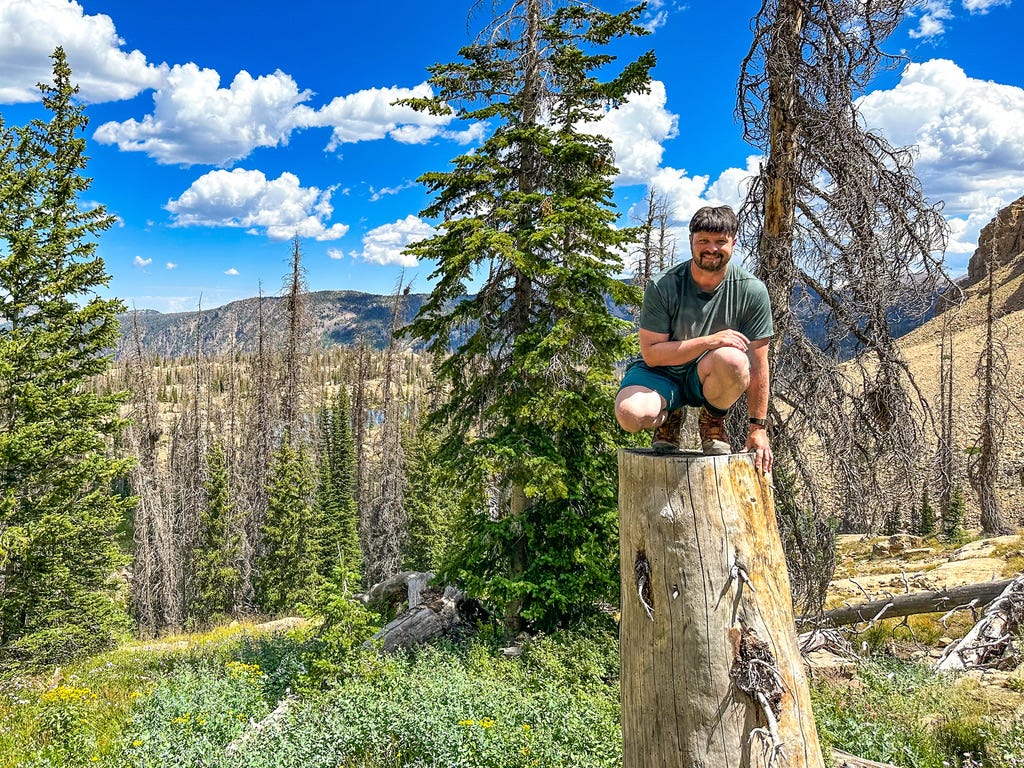What Wakes You That Isn’t Fear?
A quiet moment in the dark showed me what I’d been missing about aliveness.
The cold had settled into the kind of stillness you can feel in your teeth. My breath curled into the dark, rising just far enough to dissolve into the night air. The forest was quiet in that alert way that makes you feel watched. Not in danger, just known.
I was deep in sleep when the sound came. Sharp, delicate, unmistakable.
A twigwas crackling just beyond my tent.
My eyes stayed closed, but my body woke in full. The air shifted. Somewhere to my right, something with weight moved slowly, unhurried. Not a human's staccato crunch, but a softer rhythm. Deliberate, four beats, a pause. I could hear the whisper of fur or leaves brushing as it passed.
I didn't move. Didn't need to. My senses were doing all the moving, tuning to the night as if they'd been waiting for this invitation. There was no fear, just a wide-awake awareness that I wasn't alone.
Big shifts make good stories. But aliveness isn't measured by the size of the change, it's measured by whether you're still listening.
That moment taught me something about aliveness I'd been getting completely wrong.
The Mythology of the Big Moment
We've been sold a beautiful, terrible lie about what it means to be alive.
The culture worships rupture. The resignation letter, the ticket booked, the relationship ended. The moments you could screenshot for social media, complete with a visible before and after. We're addicted to transformation that leaves marks others can measure.
But the moment that woke me that night wasn't a leap. It wasn't even a choice. It was the smallest shift in attention. One I could have missed entirely if I'd rolled over, convinced myself it was nothing, and slipped back into unconsciousness.
What made it alive wasn't the presence of the animal.
It was my presence to the animal.
We mistake drama for aliveness all the time. We think something only counts if it disrupts our routine, challenges our assumtions, forces us to become someone new. But aliveness doesn't care about your timeline. It doesn't need to leave evidence that you can point to later as proof of your evolution.
It only asks that you stay awake long enough to feel it.
Why We've Forgotten How to Listen
In the wilderness, you don't confuse listening with passivity. You know it as a skill, a survival instinct, a form of belonging. In daily life, though, we've collapsed listening into waiting. Waiting for our turn to speak. Waiting for the "real" moment when something actually happens. Waiting for the leap that will finally justify our attention.
And in that waiting, we miss everything.
I've watched myself (and many others) do this for years. Standing in conversations, but mentally rehearsing my next response. Walking through my neighborhood, but scanning ahead for the destination. Sitting in meetings while planning what I'll do when the meeting ends (which usually involves another cup of coffee).
Always preparing for the next moment instead of inhabiting this one.
The intelligence of my body that night knew something my mind had forgotten: presence isn't preparation. It's participation.
Every cell tuned to what was near. The animal's breathing. The texture of the ground beneath it. The way the air seemed to part and seal again as it moved. My mind didn't jump ahead (Is it dangerous? Will it see me?) because my body wasn't asking for a plan. It was simply receiving.
We've trained ourselves out of this capacity. Trained ourselves to scan for the dramatic shifts while stepping over the quiet invitations that surround us constantly.
The Intelligence We've Forgotten
That night, my body remembered something my mind had trained itself to ignore: the difference between alertness and anxiety.
My nervous system didn't rev up when it sensed the animal nearby. It didn't flood with adrenaline or start scanning for threats. It simply became more present. More available. More attuned to what was actually happening instead of what might happen.
This is the intelligence we're born with and educated out of. The capacity to be fully awake without being activated. To expand our awareness without immediately plotting our response.
We've been conditioned to think aliveness requires noise. Requires movement. Requires some kind of visible engagement with the world. But that animal moving past my tent was teaching me about a different kind of vitality. The kind of vitality that doesn't announce itself but that simply is.
What Stillness Actually Is
The culture we live in treats stillness with suspicion. In the forest, you can be fully present while unmoving and it's considered mastery. In the city, you stand still on a sidewalk for too long and people wonder if you're lost.
We equate movement with meaning. We've made motion our proof of life.
But stillness isn't emptiness. It's not "nothing happening." It's something so alive that it doesn't require you to manage it.
That night, lying awake while something wild moved just beyond me, I remembered what my nervous system already knows: I don't have to earn my place in the aliveness. I don't have to perform engagement or demonstrate my worthiness through constant activity.
I can just be here. Alert. Available. Present to whatever wants to reveal itself.
This is the intelligence we're born with and trained out of. The capacity to expand our awareness without immediately plotting the next action.
The Small Cracks We Step Over
That moment has been teaching me how many quiet invitations I ignore in daily life:
The way someone's voice softens in a conversation, just slightly.
The smell of rain arriving before the first drop.
The feeling in my chest when a piece of music makes me want to turn my head and look at nothing in particular.
The split second when you realize you've been holding your breath without knowing why.
The pause between someone asking a question and your knowing how to answer.
All of them available. All of them asking for the same quality of attention I gave to that animal in the dark.
But instead of presence, I offer analysis. Instead of participation, I give planning. Instead of letting these moments be alive, I immediately start managing them.
What if the measure of aliveness isn't how dramatically you leap or how loudly you roar? What if it's how deeply you can listen when the world moves quietly around you?
The Proximity Practice
We don't get to stockpile aliveness from the big moments. They can light us up, yes, but they can't keep us lit. Sustained aliveness comes from a different muscle entirely: the one that notices.
That night in the mountains, nothing changed and everything did. Not in the way I'd tell as a campfire story, but in the way I'd carry as a compass. I remembered that my body already knows the language of stillness. I remembered that listening is not waiting; it's participating.
And I remembered that the wild is always moving nearby.
The only question is whether I'm close enough, and quiet enough, to hear it.
Your aliveness isn't waiting for permission. It's not holding out for the perfect conditions or the right moment or sufficient evidence that you deserve to feel fully alive. It's here, moving quietly around you, sending signals about what wants attention.
The animal is always just beyond your tent.
Are you awake enough to feel it breathing?
If Life As I See It resonates with you and you think others might find value in it too, consider recommending this publication to your readers or sharing this piece with someone who needs to read it.
About Alex
I’m Alex Lovell — political psychologist, yoga therapist, and writer.
Lived homeless. Been divorced. Survived a seven-car pileup with a semi. Fell in love with questions that don’t have easy answers. I’ve met a lot of thresholds. Even the one before death.
These days, I split my time between research, writing, and holding space for people figuring out who they are after everything shifted.
This Substack is where I make sense of things out loud.
I write for people in transition — between roles, beliefs, relationships, selves.
The ones quietly wondering, “What now?” but allergic to one-size-fits-all answers.
Sometimes I quote research. Sometimes I quote my own nervous system.
One speaks in data, the other in sensation. I’ve stopped choosing sides.
Free subscribers get weekly articles and insights (sometimes twice a week!). Paid subscribers get the Thursday Offerings, seasonal companion pages, post-nidra audio, and live slow sessions. Join me?






Alex, this was so tenderly written. This practice of being available and alert to "whatever waits to reveal itself" is so important -- and difficult. I am practicing and noticing, and so agree that the culture we live in, "treats stillness with suspicion". So astute! It sure does.
I think this was my favourite bit. I reread it and reread it: "In the forest, you can be fully present while unmoving and it's considered mastery. In the city, you stand still on a sidewalk for too long and people wonder if you're lost." Wow.
Alex, I stopped several times reading this. So many takeaways. So many, hmmns. Thank you for your continued commentary on aliveness. Your writing transports me to places I have not yet considered. This line “Always preparing for the next moment instead of inhabiting this one” was a hmmmn. Here’s to inhabiting this one.